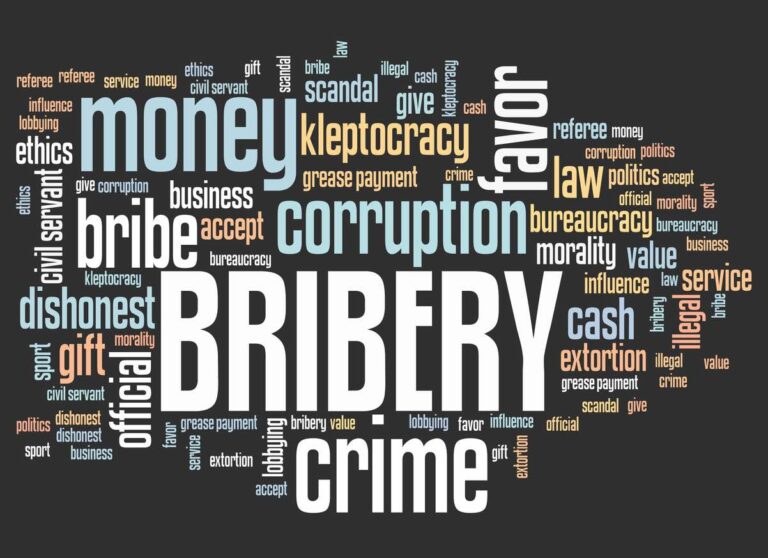This week Transparency International released its 2022 Corruption Perceptions Index (CPI), an indicator of public sector corruption that scores 180 countries based on perceptions of public sector corruption. The 2022 CPI shows that corruption remains prevalent across the Americas, as rates remain stagnant in the region:
Throughout Latin America, leaders have failed to take decisive action against corruption and strengthen public institutions. This has allowed criminal networks to strengthen their hold, wielding significant power over politicians in many countries and aggravating violence in the region with the highest per capita homicide rate.
In particular, corruption has weakened public institutions, allowing criminal networks to flourish, thereby destabilizing governments and increasing violence across the region. And weak law enforcement institutions and high levels of corruption have allowed drug cartels to expand to the Caribbean.
Countries with high CPI scores facilitate corruption in countries with low CPI scores when they tolerate or profit from money laundering:
Corruption is also a threat to global security, and countries with high CPI scores play a role in this. For decades, they have welcomed dirty money from abroad, allowing kleptocrats to increase their wealth, power and geopolitical ambitions. The catastrophic consequences of the advanced economies’ complicity in transnational corruption became painfully clear following Russia’s full-scale invasion of Ukraine.
As the Biden Administration concluded in its 2021 Strategy on Countering Corruption, the fight against corruption is a core U.S. national security interest and warrants decisive actions to combat foreign bribery and illicit finance, including steps to reduce the ability of corrupt actors to use the U.S. and international financial systems to hide assets and launder the proceeds of corrupt acts.
Whistleblowers play a critical role in countering corruption by identifying foreign bribery schemes, money laundering violations, sanctions violations, and other fraud schemes, and helping law enforcement to effectively investigate and prosecute those schemes and hold corrupt actors accountable.
SEC Whistleblower Program Rewards Whistleblowers for Disclosing FCPA Violations
The U.S. Securities and Exchange Commission’s (SEC) Whistleblower Program has been effective in attracting whistleblower disclosures about violations of the Foreign Corrupt Practices Action (FCPA). For example, during fiscal years 2018-2021, the SEC received an average of 217 whistleblower disclosures per year alleging FCPA violations. And since the beginning of the whistleblower program, the SEC has received whistleblower tips from individuals in approximately 133 countries outside the U.S. In fiscal year 2021 alone, the SEC received whistleblower submissions from individuals in 99 foreign countries.
Under the SEC Whistleblower Program, whistleblowers may receive monetary awards if they voluntarily provide original information to the SEC about violations of federal securities laws, including FCPA violations. If an eligible whistleblower’s information leads to an enforcement action in which the SEC obtains an order for monetary sanctions exceeding $1 million, the SEC is required to pay the whistleblower between 10% and 30% of the monetary sanctions collected as an award. Additionally, the SEC will pay awards based on the monetary sanctions collected in certain related actions, such as a successful enforcement action brought by the U.S. Department of Justice (DOJ).
To date, the largest SEC whistleblower awards are $114 million, $110 million, and $50 million. Whistleblowers disclosing FCPA violations may be eligible for significant awards under the program, as SEC and DOJ enforcement actions against FCPA violators often include substantial fines and penalties. Many of the largest awards have stemmed from FCPA enforcement actions.
Recent Enforcement Actions Against FCPA Violators
Two recent FCPA enforcement actions underscore how the SEC Whistleblower Program can combat foreign bribery by encouraging whistleblowers to report foreign bribery that may otherwise go undetected.

On December 19, 2022, Honeywell International Inc. agreed to pay more than $81 million to settle charges that it violated the FCPA by paying bribes in Brazil and Algeria. According to the SEC’s order, Honeywell, with the assistance of an intermediary, offered as much as $4 million to a Brazilian official to win a contract Petrobras, a Brazilian state-owned oil company. And in Algeria, Honeywell, with the assistance of an intermediary, paid money to an Algerian government official to secure a contract amendment with the Algerian state-owned oil company.
On December 3, 2022, ABB Ltd. agreed to pay $460 million to settle criminal and civil charges that it violated the FCPA. According to the SEC’s order, the charges stemmed from a scheme that occurred from March 2015 through December 2017, and involved ABB executives at its Swiss headquarters and German and South African subsidiaries who used complicit third-party service providers to funnel payments a South African official who awarded ABB a $160 million contract to provide cabling and installation work at Eskom’s Kusile Power Station.
For a complete list of recent SEC enforcement actions against FCPA violators, see SEC Enforcement Actions: FCPA Cases.
FCPA Violations and Resources for Whistleblowers
As detailed in the SEC and DOJ’s Resource Guide, the FCPA prohibits the payment of bribes to foreign officials to assist in obtaining or retaining business. This anti-bribery provision broadly applies to:
- U.S. persons;
- U.S. and foreign public companies that are listed on the stock exchanges in the U.S. or that are required to file periodic reports with the SEC; and
- certain foreign persons and companies that are acting while in U.S. territory.
Courts have interpreted “foreign officials” under the FCPA broadly. For example, employees of State-owned or State-controlled entities are considered foreign officials under the FCPA. This may include a variety of company types, since the only requirement is that the entity is “controlled by the government of a foreign country that performs a function the controlling government treats as its own.” United States v. Esquenazi, 752 F.3d 912 (11th Cir. 2014), cert. denied, 135 S. Ct. 293 (2014).

The FCPA also requires issuers to maintain adequate internal controls. These controls must provide reasonable assurance that transactions are executed and that assets are accessed and accounted for in accordance with management’s authorization. By maintaining these controls, companies are able to provide more-accurate books and records. Common violations of the FCPA internal-controls provision include:
- falsifying documents to conceal bribery payments;
- fraudulently mischaracterizing bribes as normal business expenses;
- overbilling with an understanding that some of the payment is a bribe; and
- inappropriate hiring practices, such as hiring candidates solely based on referrals by client executives and government officials.
For more information about FCPA violations, see the SEC’s Spotlight on FCPA.
Anti-Money Laundering Whistleblowers Can Combat Illicit Finance and Earn Awards
The Biden Administration’s Strategy on Countering Corruption identifies how money laundering enables corruption: “Corrupt actors and their facilitators rely on vulnerabilities in the United States and international financial systems to obscure ownership of assets and launder the proceeds of their illicit activities.”
In 2021, the Anti-Money Laundering (AML) Whistleblower Program was created to combat these illicit activities. Under the AML Whistleblower Program, the Department of Treasury will pay an award of between 10% and 30% of the money that it recovers in a successful judicial or administrative action resulting in sanctions exceeding $1 million. The program encompasses whistleblowing about violations of the:
- Bank Secrecy Act;
- International Emergency Economic Powers Act;
- Trading with the Enemy Act; and
- Foreign Narcotics Kingpin Designation Act.
The Treasury’s Financial Crimes Enforcement Network (FinCEN) is charged with enforcing the Bank Secrecy Act. The Treasury’s Office of Foreign Assets Control (OFAC) is charged with enforcing sanctions violations. The Treasury frequently works with the SEC, CFTC, and DOJ to combat these violations.
In contrast to other whistleblower programs, the AML Whistleblower Program does not impose limitations on award eligibility for whistleblowers who gain information through the performance of compliance or audit job duties. Indeed, the AML whistleblower law expressly authorizes compliance personnel to obtain whistleblower awards in that the term “whistleblower” includes an individual who provides information relating to a violation “as part of the job duties of the individual.” Non-U.S. citizens are eligible for AML whistleblower awards.
If represented by an attorney, an AML whistleblower may submit a tip anonymously. The AML whistleblower law requires the Treasury and other agencies, such as the DOJ, to take steps to protect the confidentiality of AML whistleblower submissions. Any officer or employee of these agencies must not disclose information provided by a whistleblower “which could reasonably be expected to reveal the identity of a whistleblower,” except where the agency is required to disclose the information to a defendant in a public proceeding instituted by the agency and in accordance with the Privacy Act.
CFTC Whistleblower Program Also Combats Foreign Bribery
Some FCPA violations also implicate the Commodity Exchange Act (CEA), i.e., bribery can give rise to liability for fraud, manipulation, false reporting, or a number of other types of violations under the CEA and U.S. Commodity Futures Trading Commission (CFTC) regulations. According to a CFTC whistleblower alert, foreign corrupt practices may include:
- Corrupt practices that alter the prices in commodity markets that drive U.S. derivatives prices;
- Bribes employed to secure business in connection with regulated activities like trading, advising, or dealing in swaps or derivatives, paid out of funds investors believed were being used to invest; or
- Corrupt practices used to manipulate benchmarks that serve as the basis for related derivatives contracts, as prices that are the product of corruption might be falsely reported to benchmarks.
Under the CFTC Whistleblower Program, the CFTC will issue rewards to whistleblowers who provide original information that leads to CFTC enforcement actions with total civil penalties in excess of $1 million (see how the CFTC calculates monetary sanctions). A whistleblower may receive an award of between 10% and 30% of the total monetary sanctions collected.
Original information “leads to” a successful enforcement action if either:
- The original information caused the staff to open an investigation, reopen an investigation, or inquire into different conduct as part of a current investigation, and the Commission brought a successful action based in whole or in part on conduct that was the subject of the original information; or
- The conduct was already under examination or investigation, and the original information significantly contributed to the success of the action.
In determining a reward percentage, the CFTC considers the particular facts and circumstances of each case. For example, positive factors may include the significance of the information, the level of assistance provided by the whistleblower and the whistleblower’s attorney, and the law enforcement interests at stake.
Awards are paid from the CFTC Customer Protection Fund, which is financed through monetary collected by the CFTC in any covered judicial or administrative action that is not otherwise distributed, or ordered to be distributed, to victims of a violation of the CEA underlying such action.
Contact an Experienced Whistleblower Lawyer Today
The whistleblower lawyers at Zuckerman Law have extensive experience representing whistleblowers worldwide. Contact our whistleblower lawyers today for a confidential consultation.
Tips for Whistleblowers to Qualify for an SEC Whistleblower Award
Whistleblower Attorneys Representing Whistleblowers Worldwide
SEC Whistleblower Program: Process to Quality for an SEC Whistleblower Award








